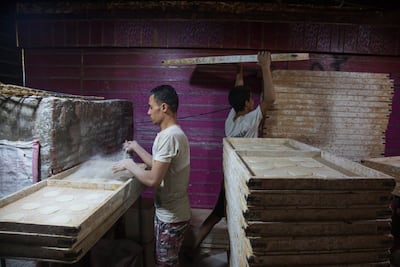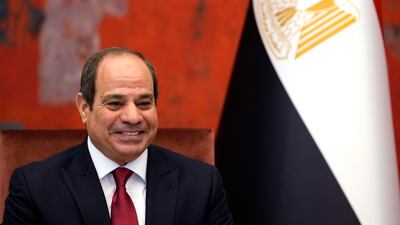Egypt's President Abdel Fattah El Sisi on Tuesday invited critics of his government to “scream at us”, in an effort to encourage dialogue and promote national unity.
Speaking at the closing session of the three-day Egyptian Economic Conference 2022 in the New Administrative Capital, Mr El Sisi said: “This is our country. It belongs to and is for all of us.
“It is not mine or the government’s. Let us always sit together and talk. Everyone should say his piece. We want people who attack and scream at us, rather than scream on the streets,” he said.
“The discussion should be a prelude to the success of the Egyptian state. Together, we can.”
He called on Egyptians to close ranks and work harder to push the most populous Arab nation forward, citing the new capital, built in the desert east of Cairo, as an example.
“That’s how you should dream. We don’t eat, sleep or rest” until it becomes a reality, he said.
Mr El Sisi defended his government’s policies since he took office in 2014, seeking to explain in detail the reasoning and motivation behind them.
The former general’s lively and passionate speech lasted close to two hours — by far his longest address since he became president of the nation of 104 million people.
It came amid an acute economic crisis caused in large part by the fallout from the Russia-Ukraine war and the coronavirus pandemic before it.

In the eight months since the war broke out, Egypt’s pound has lost more than 20 per cent of its value, up to $25 billion has left the country’s once-lucrative debt market and negotiations with the IMF have begun over a loan Egypt needs to shore up its finances.
Inflation is in double digits — a reflection of soaring food and fuel prices — and a foreign currency crunch has badly hit local industries dependent on imported components.
The crisis has cost the government billions of Egyptian pounds in support programmes to cushion the impact of higher prices on the most vulnerable and forced it to twice put off lifting subsidies on domestic electricity.
It has also kept the price of subsidised bread unchanged despite the steep rise in the price of wheat. Egypt imports about half of the 20 million tonnes its population consumes each year.

Mr El Sisi's apparent encouragement of criticism comes amid moves towards greater tolerance of dissent.
Egypt has had an effective ban on street protests since 2013, a measure taken after two years of near-daily demonstrations across the nation after a 2011 uprising that toppled long-serving ruler Hosni Mubarak.
Mr El Sisi has often blamed the uprising and the political turmoil that followed it for derailing the economy and enshrining an anti-government culture.
The Egyptian leader, however, has in recent months relaxed his zero-tolerance policy on dissent, freeing hundreds of political prisoners, most of whom had been held in pretrial detention.
He has allowed some dissidents to return home from self-exile abroad and tolerated a carefully-measured margin of freedom of expression that left experts feeling free to criticise — albeit cautiously — the government’s economic policies.
Last April, he called for a national dialogue to chart the country’s political future. It remains in the preparatory phase and is expected to start later this year or early in 2023.

“I want the whole of Egypt to be like this,” President El Sisi said, referring to the new capital.
The city, which has yet to be inhabited and formally named, has been a pet project of the Egyptian leader.
“If we want this country to move forward, we must all work together. What is required is very, very huge. We must unite our efforts so that the country moves forward, not so that Abdel Fattah stays in power.”
Mr El Sisi defended the mega projects his government has undertaken under his personal supervision, saying they provided employment to five to six million people over the past seven years.
Speaking of his dream of a prosperous Egypt, he said: “I want this country’s revenues to double every three to four years.
“If I didn’t know what I was doing, I would not be standing here talking to you like I am now. Every government sector you talk about has been the target of so much effort.”


